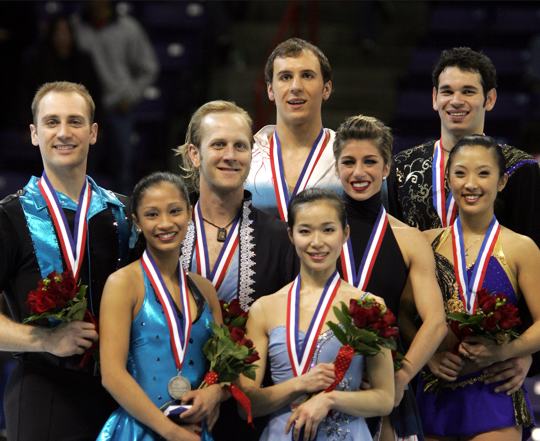|
Well this one didn't turn out according to the script. No, not at all. After the Short Program, it was expected that Rena Inoue & John Baldwin and Naomi Nari Nam & Themi Leftheris would contend for the gold and silver, while Brooke Castile & Benjamin Okolski and Tiffany Vise & Derek Trent would vie for the bronze and pewter. Instead, Castile & Okolski gave the outstanding performance of the day, while the three other teams all faltered in the Free Skate. Skating third in the third of four warm-ups, Amanda Evora & Mark Ladwig, gave an adequate performance to "West Side Story." They had Decent Program Component scores, in the low to mid 6s, but five of 13 elements had a majority of negative GoEs. There basic skating was decent, but so far as showing a relationship in the context of the music, that was pretty much non-existent. Throw triple Lutz was two footed, and on triple Salchows, he put his hand down and she cheated the jump and stepped out, for a downgrade. Throw triple loop, a double-double jump sequence, and their pair spin were the three other weakly executed elements. In the end, however, it was enough to move up to fourth place overall and the pewter medal. Vise & Trent were first to skate in the last warm-up group, and their performance was nothing short of a mess. Their triple toe loops were downgraded, and throw triple loop was aborted on the takeoff and ended up a single. Throw triple Salchow, which was supposed to be an attempt at a quad that didn't get close to four rotations, resulted in a fall. A flying change combination spin was poorly executed, rotating in slow motion, and received five GoEs of -1. Their individual Program Component marks ranged from 5.00 to 6.50. They dropped to fifth overall in the standings. Next to skate, Castile & Okolski, who placed 8th at the 2006 Nationals, gave an outstanding performance. Their opening triple twist and throw triple Salchow were outstanding, with GoEs consisting of all but one +2 and +3. Finally, an American pair team with a real triple twist! The only element to receive a significant number of negative GoEs was their change combination spin. Their Program Components were in the high 6s to low 7s. On their victory, Castile said, "It is a shock, but at the same time, it's something we've always worked to attain," Castile said. With nearly a three point lead over Castile & Okolski in the Short Program, and kind of semi-decent performance from Inoue & Baldwin would have been enough to retain their title, but even semi-decent they did not deliver. Baldwin fell on their opening triple toe loops, which alone cost them the victory. Throw triple Axel also ended up in a fall. Again, alone costing them the victory. Their back outside death spiral had a poor exit, and received four GoEs of -1. That element too was nearly the margin of victory. Their Program Components were in the high 6s to low 7s, 0.77 points in total behind Castile & Okolski. Baldwin commented on the performance, saying "Just to be at this
championship after everything we've been through this season is
great," referring to the reported attach at the Grand Prix Final in
St. Petersburg. Some reporters remained skeptical of the report, to
which Baldwin responded, "All I can say is it happened."
It is odd however, there is no supporting confirmation from the team
leader or team doctor, or from the doctor, who we assume, diagnosed the
reported concussion and vertigo. After landing a nice triple toe - triple toe sequence, their triple
twist had a poor catch. Then on throw triple Salchow Nam fell off
the landing edge of the element. Throw triple loop also resulted in
a major crash. 5.83 points shot to hell on those two elements
alone. The team needed strong element scores, since their Program
Components were only in the mid 6s, fourth best of the group. But
the team looked tentative and did not attack the program. Said Nam,
After the triple twist, "we got a little overwhelmed. |
|||||||||||||||||||||||||||||||||||||
| Castile & Okolski | Inoue & Baldwin | Nam & Leftheris |
|
2007 Senior Pairs Medalists |
|
|
